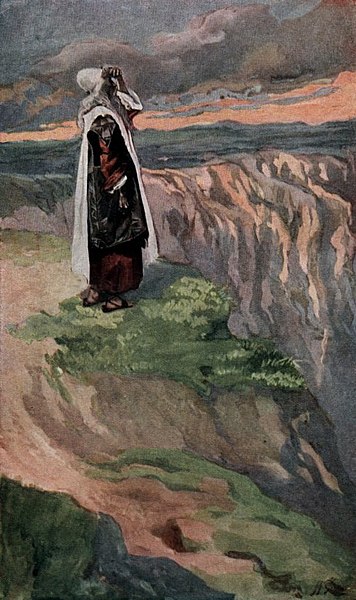今回でこの連載を終わる。この連載は批判的なものであり、私の内なる預言者が表に出てきて語ったといえるだろう。預言者というより、スクルージ(ディケンズ『クリスマス・キャロル』に登場する守銭奴)のほうが近いかもしれない。

『クリスマス・キャロル』の挿し絵(フレッド・バーナード)から、左がスクルージ
聖書の読み方やスモール・グループ運動における人間関係の誘惑について分析した部分がまだあと2章あるが(この連載は、来春刊行される著書『いつ神を忘れたか』からの引用)、想像力のある読者なら、私が何を書くか、お分かりになるだろう。ただ、この道徳的で心を癒やす理神論的な時代が終わったとしても、私たちには常に、自分や自らの感情に対する信仰を持ちたいという誘惑があるとだけ言っておく。
[toggle]With this essay, I will stop introducing chapters of the book that will come out in the spring, When Did We Forget God? (Tyndale). The essays I’ve published here have been mostly critical in nature—it’s my inner prophet coming to the surface. Or maybe just my inner Scrooge. I have a couple more chapters analyzing the horizontal temptation in how we read the Bible and the small-groups movement, and the imaginative reader can probably guess what I might say in such chapters. Let’s just say the temptation to make our faith about ourselves and our feelings is with us always, even to the end of this moral, therapeutic, deist age. [/toggle]しかし、前進するための道を示さずにいるのは無責任だろう。『いつ神を忘れたか』の第3部でそのことに触れている。しかし、この連載を書き終えた今、欲望に関する書籍をもっと読み、深く考える必要があることに気づいた。特に神に対する欲望について。だから、第3部はきわめて複雑なトピックに手を出してみただけにすぎない。
[toggle]But it would be irresponsible to not at least point some way forward, and the third part of the book attempts to do just that. But now that I’ve finished it, I realize I need to do a lot more reading and thinking about desire, and especially desire for God. So the third part is really just a few forays into a very complex topic. [/toggle]この連載は継続するが、今後は機会があれば掲載することになる。この連載の準備をしながら、『いつ神を忘れたのか』で触れなかったトピックをいくつか書き留めてきた。この連載の中でなら良い記事になるのではないかと思ったのだ。しかし、読むに値するほど価値ある記事を毎週書けるほど自分は賢くないので、今後、この連載は、主からインスピレーションが与えられた時、もしくは私が不遜にもそう感じた時に書くつもりだ。
[toggle]This column will continue, but it will be more on an occasional basis. As I’ve been preparing these essays for online, I’ve been taking notes on topics that I have not addressed in the book but that might make for good reflections here. But I don’t think I’m smart enough to have something worth reading each and every week, so from this point on, this series will appear as the Lord inspires, or as hubris makes me think he’s doing so.For now, here is a chapter from the third part of the book. [/toggle]
欲望の始まり
[toggle]The Beginning of Desire [/toggle]箴言の著者は、「主を畏れることは知恵の初め」と言う(1:7)。ここでいう「畏れ」とは、健全な敬意と畏敬の念のことだ。しかし、神との関係において、取り組むべき別な種類の「畏れ」がある。その「畏れ」の観点からいえば、「主を畏れることは、主を求めることの初め」だ。
[toggle]The writer of Proverbs says that the fear of the Lord is the beginning of wisdom. The fear he refers to is a healthy reverence and awe. But there is another type of fear we have to wrestle with in our relationship with God. In terms of that fear, I’d put it like this: The fear of God is the beginning of longing for him. [/toggle]前の連載で私は、「実は私たちは、深いレベルまで神を愛し、もっと知りたいと願っている」と書いた。私たちは神を求めているが、それにもかかわらず神を忘れ去ってしまっている。つまり、急激に広がった人間関係のための行動により神を軽んじているのだが、それでも私たちは神を求めている。これは、今まで私が議論していたことと正反対のように聞こえるかもしれないが、それは違う。
[toggle]I ended the last chapter noting that we do,in fact, long to know and love God at some deep level. We do desire God. In spite of all the ways we have forgotten him, that is, marginalized God in our flurry of horizontal activity, we still want God. This appears to contradict what I’ve been arguing. Not really. [/toggle]この問題の緊急性を伝え、より明確にするために、信仰における縦の関係(神との関係)と横の関係(人間関係)の違いについては、はっきりとしたコントラストをつけて描いてきたつもりだ。「はっきりとしたコントラスト」というのはつまり、ドラマチックな方法で要点を絞り込むような誇張を行ってきたということだ。しかし、もしここで私が単に「気持ちを入れ替えて神を求めるようになりなさい」と言ったなら、それは誇張ではなく、ただの作り話になってしまう。なぜなら、そんなに単純なことではないからだ。
[toggle]I have drawn a stark contrast between the vertical and horizontal dimensions of faith to bring some clarity and urgency to the problem. Such stark contrast is hyperbole, using language in a dramatic way to drive home a point. But if I were to turn now and say all we have to do is make up our minds to start desiring God, I will have moved from hyperbole to fiction. Because it’s not that simple. [/toggle]深いところで私たちは神を求めている。そうだ。たとえ横の関係にしか目が向いていなくても。しかし、その横の関係への注目だけが、神を忘れた原因ではない。ただ気が散っていただけなのではないのだから。牛乳を買いにスーパーまで行って、カートいっぱい買い物をしたのに、結局、目的のものを買い忘れてしまったということではない。私たちは神の記憶をわざと消すように努力してきたからこそ、神を忘れてしまったのだ。なぜなら、時に神は、まるで悪い夢か何かのように、私たちを困惑させ、不安にさせるからだ。
[toggle]Deep down we desire God still, yes, despite all the focus on the horizontal. And yet the reason for the horizontal focus is not just that we have forgotten God—as if we just got distracted, like going to the store to buy milk, then filling the shopping cart but going home without what we came for. No, we have forgotten God because we deliberately try to erase him from our memory. That’s because sometimes God is like a bad dream that leaves us confused and anxious. [/toggle]神との関係において、この側面に気づいているかいないかで大きな違いがある。神が時に困惑と不安を与えないのであれば、私たちがまだ生ける神と出会っていないということだからだ。
[toggle]It is crucial that we recognize this dimension of our relationship with God. If God doesn’t at times leave us confused and anxious, we have not yet met the living God. [/toggle]
ジェームズ・ティソ「約束の地を望み見るモーセ」
アブラハムに聞いてみるがいい。神がどのようにして年老いた自分から偉大な国を作り出すのか、死ぬまで理解できなかった男に。
モーセに聞いてみるがいい。人生をかけて約束の地に民を導こうとしていたのに、その地に入ることを拒まれた男に。
ダビデに聞いてみるがいい。神が祈りを聞いてくれないという詩をたくさん残した男に。
エレミヤに聞いてみるがいい。「語れ」と促す神に対して怒りに燃えていた男に。
主イエスに聞いてみるがいい。十字架の上で神に見捨てられたと感じた男に。
[toggle]Just ask Abraham, who could not for his life figure out how God was going to produce a great nation from his aged loins.Ask Moses, whose whole purpose in life was to lead the people into the Promised Land, only to be denied entry himself.
Ask David, who in many a psalm complained that the Lord did not hear him.
Ask Jeremiah, who was furious with God for prodding him to preach.
Ask Jesus, who felt as if God had forsaken him on the cross. [/toggle]
すべての信者は遅かれ早かれ分かるだろう。この神の手に落ちることが、どれほど恐ろしいことなのかを。だからこそ、地の塩であるどの信者も、神について相反する感情を深く抱いている。そうだ。絶対に間違いのない知恵に支配されることを切望しているのに、誰かに、または何かに従わなくてはならないことを不快に思っている。真に愛してくださる方との親密な関係を求めているのに、自分が自由にできなくなることを恐れている。私たちは自分の望んでいるものを不快に思い、私たちが願うものを恐れている。簡単に言えば、神を愛しているのに憎んでいるのだ。
[toggle]Every believer sooner or later knows it is a fearsome thing to fall into the hands of this God. Which is why any believer worth his or her salt is deeply ambivalent about God. Yes, we yearn to be ruled by Unfailing Wisdom—and yet we resent having to submit to anyone or anything. We crave intimacy with Pure Benevolence—but we fear the loss of independence. We resent the one we long for, and we are afraid of the One we desire. In short, we love God and we hate God. [/toggle]このことを認めなければ、私たちは霊的に成長することができない。単純に、私たちが本当に神を愛していると考えているなら、人生の王座に神を戻すように諭すだけでいいと考えるかもしれない。しかし、それでは自分を欺いていることになる。それでは信仰が絵空事になってしまう。それは、悲惨でありながらも素晴らしい人の心の現実ではない。(後編に続く)
[toggle]We can make no progress in the spiritual life until we acknowledge this. If we think we really do love God simply, and all we need is a gentle reminder to put him back on the throne of our lives, we’re kidding ourselves. We’re living a fantasy faith. That is simply not the sordid and splendid reality of the human heart. [/toggle]